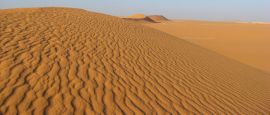Algeria History, Language and Culture
History of Algeria
Algeria's history stretches back thousands of years and reflects its strategic position between Africa, Europe and the wider Mediterranean world. The region was first inhabited by Berber communities, whose cultural influence remains strong today. Phoenician traders established coastal settlements, followed by Roman rule, which left behind some of the best-preserved Roman ruins in North Africa, including Timgad and Djemila.
After the fall of Rome, successive waves of Vandals and Byzantines controlled parts of the territory before Arab-Muslim armies arrived in the 7th century, introducing Islam and Arabic culture. Over the centuries, local Berber dynasties and coastal cities flourished, while the Ottoman Empire incorporated Algeria in the 16th century, making Algiers a major Mediterranean power and naval centre.
France invaded in 1830, beginning more than 130 years of colonial rule. The struggle for independence culminated in a brutal war from 1954 to 1962, led by the National Liberation Front. Algeria gained independence in 1962 and later experienced periods of political upheaval, including civil conflict in the 1990s. Today, the country continues to balance a strong national identity with its diverse cultural and historical heritage.
Did you know?
• Algiers was once one of the most powerful corsair (privateer) bases in the Mediterranean. During the Ottoman period, European powers paid tribute to avoid attacks on their shipping, giving the city the nickname "the Regency of Algiers".
• Algeria was once one of the world's largest wine producers. During French colonial rule in the late 19th and early 20th centuries, the country supplied vast quantities of wine to Europe, particularly after French vineyards were devastated by disease.
• The prehistoric rock art in Tassili n'Ajjer National Park reveals that the Sahara was once a lush, green landscape with rivers, cattle and wildlife. Some paintings date back more than 10,000 years, dramatically challenging modern perceptions of the desert as timeless and barren.
Language in Algeria
Algeria has two official languages: Arabic and Tamazight (Berber). Modern Standard Arabic is used in government, education and the media, while Algerian Arabic (Darja) is the everyday spoken language in most cities and towns. Tamazight, spoken in several regional varieties, is widely used in Kabylie and other Berber-speaking areas.
French also plays a significant role in daily life and business, particularly in urban areas. It is commonly used in administration, higher education, commerce and on signage. Many educated Algerians speak French fluently, and it is often the most practical language for visitors who do not speak Arabic.
English is increasingly taught in schools and is becoming more visible among younger generations, but it is not yet widely spoken outside certain professional sectors.




 You know where
You know where